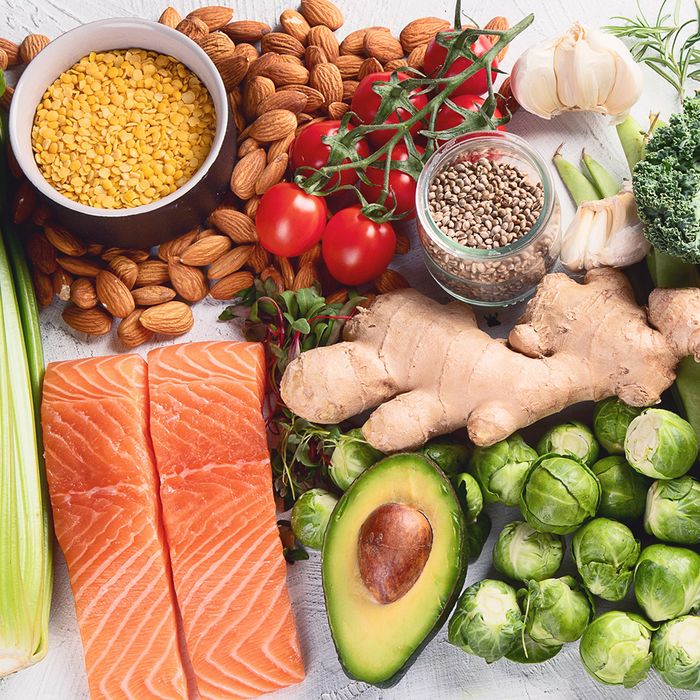
What is an Eczema Friendly Diet?
Share
What is an Eczema Friendly Diet?
What is eczema?
Eczema or atopic dermatitis is a condition that often evolves as a result of inflammation and causes dry and itchy skin.
What foods should I eat or avoid if my skin is prone to eczema?
An anti-eczema diet is in effect an anti-inflammatory diet and there isn’t a one size fits all approach to an eczema friendly diet.
Focusing on the following anti-inflammatory foods may help reduce symptoms:
What foods should I eat?
Fatty Fish - Omega 3 Fatty Acids
Omega 3 fatty acids are anti-inflammatory and can be found in high amounts in oily fish such as salmon and herring.
Itchy skin conditions are also associated with defects in the skin’s barrier function. Omega-3 supplements may help to repair and rebuild skin-cell membranes which helps your skin retain water and therefore has the potential to soothe skin.
Make sure you include 1-2 portions of oily fish in your diet per week and supplement if necessary. If you follow a vegetarian or vegan diet then consider buying a vegan omega 3 supplement developed from seaweed for example.
Probiotics-rich food
When we think of probiotics we often think about the little sachets from the pharmacy or mini-drinks such as Yakult found in supermarkets but it’s possible to get probiotics directly from food. Probiotics that contain live cultures such as yoghurt can help support a strong immune system which can alleviate flare-ups.
Foods rich in probiotics include:
- sourdough bread
- miso soup
- naturally fermented pickles
- kefir
Foods that Contain Quercetin
Quercetin is commonly found in many fruits, vegetables, leaves, seeds, and grains and is a flavonoid which has been linked to improved inflammation, blood pressure, and blood sugar levels. Foods that contain quercetin are:
- Apples
- Raspberries
- Onions
- Blueberries
- Spinach
- Kale
Of all foods onions contain the highest amount of quercetin
And what Foods Should I Avoid?
Certain foods can trigger eczema which include dairy, eggs, soy & nuts:
- citrus fruits
- dairy
- eggs
- gluten or wheat
- soy
- spices, such as vanilla, cloves, and cinnamon
- tomatoes
- some types of nuts
Also be aware of the fact that many ready-made processed foods contain soy and Omega 6 fatty acids which are known to cause inflammation..
Any processed or sugary foods should be avoided to improve inflammation and general health. Sugar for example cases insulin-levels to spike which causes inflammation. Enjoying a sugary snack is fine every now and then but try and avoid sugar on a daily basis. A lot of products have hidden sugars such as fruit drinks, smoothies, cereals, bread, yoghurts etc.
So what plan should I follow?
So what's the key to an eczema friendly diet? The first point is to stick to food as nature intended, don’t consume any processed foods but only food found in its natural form: vegetables, fish, steak, salad etc. Some people have found relief from following the Mediterranean diet which includes:
- fruits
- vegetables
- fish, which are high in omega-3 fatty acids
- healthy fats, such as olive oil
Remember it is important to get sufficient calcium in your diet - especially as we age it is harder for us to absorb. Vitamin D helps to increase the absorption of calcium in food. Calcium rich foods include milk, dark green leafy vegetables, almonds, sardines, salmon with bones, and tofu.
Elimination Process
Try the process of elimination to find out what causes flare-ups. Oftentimes flare-ups can be caused by just one food group which means you don’t have to restrict your diet too much. Try to remove one food-group at a time to get the best results.
In the End
Focusing on a healthy diet such as the Mediterranean diet is not just good for your skin health but also better for your long-term health. Managing eczema with the right products and the right diet can bring flare-ups to a manageable level or even stave off flare-ups which is the goal.
